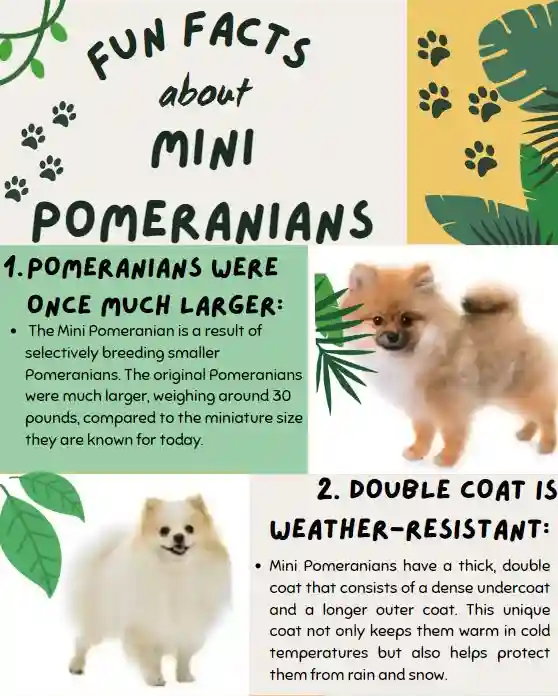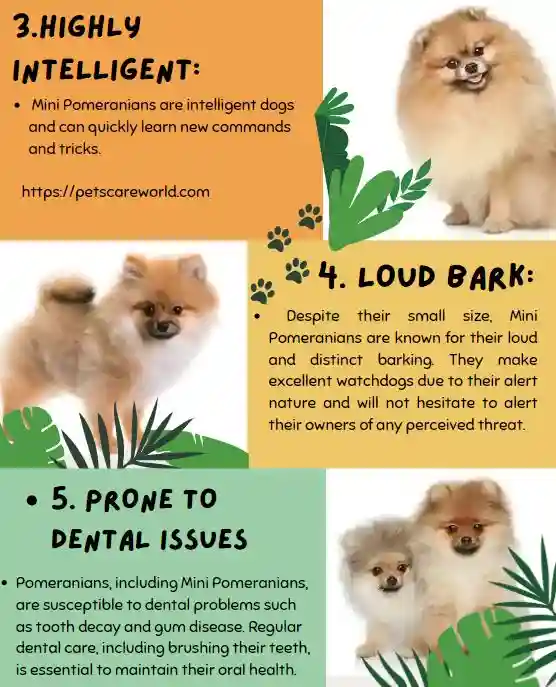Hi everybody! Mini Pomeranians are tiny bundles of joy that have captured the hearts of dog enthusiasts worldwide. Known for their fluffy coats, charming personalities, and petite stature, these dogs make wonderful companions. In this comprehensive guide, we will delve into every aspect of Mini Pomeranians, from their characteristics to their history, shedding light on essential facts and costs associated with these pint-sized pets.
Mini Pomeranian Characteristics

| Characteristic | Description |
|---|---|
| Size and Appearance | Height: 6 to 7 inches tall Weight: 3 to 7 pounds Double coat, various colors |
| Temperament | Lively, curious, outgoing, confident, affectionate, loyal |
| Intelligence | Intelligent, quick learners, but can be stubborn |
| Exercise Needs | Moderate exercise requirements, regular walks and playtime |
| Lifespan | 12 to 16 years, making them a long-term companion |
- Size and Appearance: Mini Pomeranians are known for their diminutive size, standing at around 6 to 7 inches tall and weighing between 3 to 7 pounds. Their plush double coat comes in various colors, including orange, black, cream, blue, and more. These small dogs have fox-like face with bright, expressive eyes and a plume-like tail that arches over their back.
- Temperament: Despite their small stature, Mini Pomeranians are bursting with personality. They are often described as lively, curious, and outgoing. These dogs are known for their confidence and sometimes even exhibit a bit of a “big dog” attitude. They are affectionate and loyal to their owners, making them excellent companions.
- Intelligence: Mini Pomeranians are intelligent dogs. They pick up on commands quickly and are eager to learn. However, their intelligence can sometimes lead to stubbornness, so consistent training from an early age is crucial.
- Exercise Needs: These little furballs have moderate exercise requirements. Regular walks and playtime in a secure area are usually sufficient to keep them happy and healthy. Keep in mind that they have a lot of energy for their size, so they enjoy short bursts of activity throughout the day.
- Lifespan: Mini Pomeranians typically have a lifespan of 12 to 16 years, making them a long-term commitment for potential owners.
The History of Mini Pomeranians

The history of Mini Pomeranians is fascinating and involved with their larger counterparts, the Pomeranians2. Here’s a brief overview:
- Ancestry: Mini Pomeranians, like Pomeranians3, descend from large sled-pulling dogs used in the Arctic region. Over generations, they were bred down in size to become the beloved companions we know today.
- Royal Connections: These small dogs gained immense popularity during the 18th century when Queen Victoria of England fell in love with the breed. She played a significant role in reducing their size further, resulting in the “mini” Pomeranians we recognize today.
- Pop Culture: Mini Pomeranians have made appearances in various forms of pop culture, from movies to fashion. Their adorable looks and charming personalities have solidified their status as beloved pets and celebrity companions.
Interesting Facts About Mini Pomeranians

- Mini but Mighty: Despite their small size, Mini Pomeranians have a big bark. They are excellent watchdogs and won’t hesitate to alert you to any potential intruders.
- Royal Roots: Queen Victoria’s love for Pomeranians helped establish them as a fashionable and desirable breed among European nobility.
- Ideal Travel Companions: Mini Pomeranians are small enough to accompany their owners on flights and road trips, making them excellent travel companions.
- Fur-tastic Coats: Their double coat not only keeps them warm but also makes them irresistibly fluffy and cuddly.


How to Take Care of Miniature Pomeranian Dogs
Taking care of Mini Pomeranians is a rewarding journey that involves various aspects, from nutrition to grooming, training, and exercise. These pint-sized companions deserve the best care to thrive and lead healthy, happy lives. Here’s a comprehensive guide on how to care for your beloved Miniature Pomeranian:

Feeding Your Miniature Pomeranian: A well-balanced diet is the cornerstone of your Miniature Pomeranian’s health and well-being. Consider the following tips to ensure your pup gets the nutrition they need:
1. Appropriate Diet: Miniature Pomeranians are a small-sized breed, and their diet should be tailored to their unique needs. Opt for high-quality dog food that is rich in protein, calories, essential minerals, and vitamins. Consult your vet for recommendations on the best food for your Mini Pom.
2. Age and Size Considerations: As Miniature Pomeranian puppies grow, their nutritional requirements change. Ensure that you provide food appropriate to your dog’s age and size. Puppies, adults, and senior dogs have different dietary needs.
3. Feeding Schedule: Establish a consistent feeding schedule for your Miniature Pomeranian. Regular mealtimes help regulate their digestion and maintain their overall health.
4. Proper Portions: Avoid overfeeding by providing the correct portion sizes. Overfeeding can lead to weight issues, which can be a concern for small breeds like Mini Pomeranians. Follow the recommended guidelines on the dog food packaging or consult your vet for guidance.
5. Fresh Water: Always keep clean and fresh water available to your Miniature Pomeranian. Hydration is essential for their health, and access to water should be unrestricted.
6. Special Dietary Considerations: Some Miniature Pomeranians may have specific dietary needs or allergies. If you suspect any food sensitivities or allergies, consult your vet to determine an appropriate diet plan.
Grooming Your Miniature Pomeranian

Grooming your Miniature Pomeranian is not only about keeping them looking their best but also ensuring their overall health and well-being. Here’s a comprehensive guide to maintaining your Mini Pom’s coat and hygiene:
1. Brushing: The Miniature Pomeranian’s coat is prone to tangling and matting if not combed at least twice a week. Regular brushing is crucial to keep the coat in pristine condition and prevent mats or tangles. Use a suitable dog brush or comb, starting from the tips and working your way to the roots.
2. Bathing: Bathe your Miniature Pomeranian when necessary, typically every 6 to 8 weeks or as advised by your vet. Use a high-quality canine shampoo to maintain the coat’s health. Ensure the water is clean and comfortably warm, and after the bath, towel dry your pup gently.
3. Ear Cleaning: Regularly inspect and clean your Miniature Pomeranian’s ears as needed. Use a vet-recommended ear-cleaning solution and cotton balls. Be gentle to prevent any discomfort or injury.
4. Nail Trimming: Trim your Mini Pom’s nails every couple of weeks or as needed to keep their feet in good condition. It’s essential to start nail trimming when your dog is young, so they become accustomed to the process. If you’re unsure, seek guidance from your vet or a professional groomer.
5. Teeth Brushing: Miniature Pomeranians are prone to dental problems, so pay close attention to their oral hygiene. Inspect your pup’s teeth and gums regularly and brush their teeth with a dog-friendly toothbrush and toothpaste. This helps prevent tartar buildup and ensures their dental health.
6. Eye Cleaning: Check your Miniature Pomeranian’s eyes for any signs of redness or excessive discharge. Keeping their eyes clean is essential for preventing infections and maintaining their visual health.
7. Regular Examination: During grooming sessions, take the opportunity to inspect your Miniature Pomeranian’s mouth, ears, and overall health. Look for any signs of allergies, infections, or other health issues. Early detection can lead to prompt treatment and better outcomes.
8. Positive Grooming Experience: Make grooming a positive experience for your Miniature Pomeranian by offering praise and rewards. This helps build trust and makes the grooming process more enjoyable for both you and your furry companion.
Training Your Miniature Pomeranian
Miniature Pomeranians are incredibly intelligent dogs, but their independent nature can sometimes pose training challenges. To ensure a well-behaved and happy Miniature Pomeranian, follow these training guidelines:
1. Start Early: Early socialization and enrolling your pup in puppy training classes are vital steps. These early experiences help channel their boundless energy in a positive direction and teach essential social skills.
2. Positive Reinforcement: Miniature Pomeranians respond exceptionally well to positive reinforcement techniques. Use treats, praise, and affection as rewards during training sessions. Avoid harsh punishments, as they can make your Mini Pom stubborn.
3. Consistency is Key: Establish clear and consistent rules for your Miniature Pomeranian. This clarity helps them understand expectations and reinforces good behavior.
4. Beyond Training Sessions: While formal training is essential, spending extra quality time with your Miniature Pomeranian is equally important. Engage in activities such as:
- Socialization: Introduce your pup to various people, pets, and environments to build confidence and reduce anxiety.
- Leash Training: Teach your Miniature Pomeranian to walk on a leash comfortably, ensuring pleasant walks for both of you.
- Crate Training: Crate training helps with housebreaking and provides a safe haven for your pup.
- House and Potty Training: Be patient during house and potty training. Consistency and positive reinforcement are crucial for success.
- Basic Commands: Teach fundamental commands like sit, stay, go, and shake hands to ensure obedience.
Key Health Considerations for Mini Pomeranians

While Mini Pomeranians are generally robust, there are specific health considerations that pertain to these petite companions. Owners of Mini Pomeranians should be well-informed about the following health issues:
- Vulnerability to Injuries: Owing to their diminutive size and delicate frame, Mini Pomeranians are more susceptible to injuries than their larger counterparts. Owners should exercise extra caution to prevent accidents.
- Genetic Tracheal Concerns: A noteworthy genetic condition affecting Mini Pomeranians is tracheal collapse. This condition arises when the cartilage supporting the windpipe weakens, causing a narrowing of the trachea. To mitigate this concern, it’s advisable to use a harness and leash rather than a collar to minimize strain on the neck.
- Temperature Sensitivity: Mini Pomeranians, especially when young, have an increased susceptibility to hypothermia. It’s imperative to keep them warm during cold weather and shield them from extreme temperature fluctuations.
- Infection Susceptibility: Compared to their larger counterparts, Mini Pomeranians may have a heightened susceptibility to infections. Routine veterinary check-ups and rigorous hygiene practices are essential for preventing and managing infections.
- Ocular Issues: A range of eye problems, including cataracts, corneal dystrophy, and progressive retinal atrophy, can afflict Mini Pomeranians. Regular ocular examinations conducted by a veterinarian play a pivotal role in detecting and addressing these issues.
- Luxating Patellas: This degenerative condition entails the displacement of the kneecap due to weakened muscles and tendons. It can induce pain, lameness, and an altered gait. Regular veterinary assessments are instrumental in monitoring and addressing this condition.
- Epileptic Tendencies: Epilepsy, characterized by recurrent seizures stemming from abnormal brain activity, can affect Mini Pomeranians. Thoughtful treatment plans can reduce the frequency of seizures and enhance the overall quality of life for afflicted individuals.
- Allergenic Sensitivity: Mini Pomeranians are prone to diverse allergies, encompassing pollen, molds, specific foods, and flea saliva. It is essential to be vigilant for signs of allergies such as itching or digestive disturbances and to consult with a veterinarian for suitable management strategies.
- Dental Diligence: Similar to their larger Pomeranian counterparts, Mini Pomeranians are inclined to dental problems, encompassing gum ailments and premature tooth loss. Consistent dental care, including the regular brushing of their teeth, stands as a critical component in preserving their oral health.
Costs Associated with Mini Pomeranians

- Initial Purchase: The cost of acquiring a Mini Pomeranian puppy can vary widely based on factors like pedigree, breeder reputation, and location. On average, you can expect to pay between $1,000 to $3,000.
- Ongoing Expenses: Mini Pomeranians require regular grooming, food, veterinary care, and accessories like toys and beds. Be prepared for an annual expenditure of approximately $1,000 to $2,000.
- Health Care: Mini Pomeranians can be prone to certain health issues, such as dental problems and luxating patellas. It’s essential to budget for potential medical expenses.
Mini Pomeranian Size

- Height: Mini Pomeranians typically stand between 6 to 7 inches tall at the shoulder.
- Weight: These petite pups usually weigh between 3 to 7 pounds, making them the perfect size for apartment living.
Conclusion
Mini Pomeranians are delightful little companions packed with personality and charm. Their history, characteristics, and interesting facts make them a beloved breed among dog lovers. While they come with some costs and care considerations, the joy they bring into your life is immeasurable. If you’re considering adding a Mini Pomeranian to your family, be prepared for a long-lasting bond with these lovable pint-sized pets. Hope you enjoyed this detailed article. For further reading4, you can always refer. All the best!
Frequently Asked Questions (FAQs)
Are Mini Pomeranians good with children and other pets?
Yes, Mini Pomeranians can be excellent family pets, but they may not tolerate rough handling from small children. Early socialization is key to ensure they get along well with other pets.
Do Mini Pomeranians shed a lot?
Yes, they do shed quite a bit. Regular grooming and brushing can help manage their shedding and keep their coat in good condition.
Are Mini Pomeranians easy to train?
While they are intelligent, they can also be a bit stubborn. Consistent training and positive reinforcement work best with Mini Pomeranians.
How often should I groom my Mini Pomeranian?
Regular grooming, including brushing, bathing, and trimming, should be done every few weeks to keep their coat healthy and mat-free.
Can Mini Pomeranians live in hot climates?
These dogs are more comfortable in cooler temperatures due to their thick double coat. If you live in a hot climate, take precautions to keep them cool and hydrated.
What is the average lifespan of a Mini Pomeranian?
Mini Pomeranians typically live for 12 to 16 years if provided with proper care and a healthy lifestyle.
Article Sources & Footnotes
“We at PetsCareWorld are committed to providing accurate and reliable information. Our articles are thoroughly researched, reviewed by experts, and based on high-quality sources, including vet consultations and peer-reviewed studies. You can trust the information we provide.”






